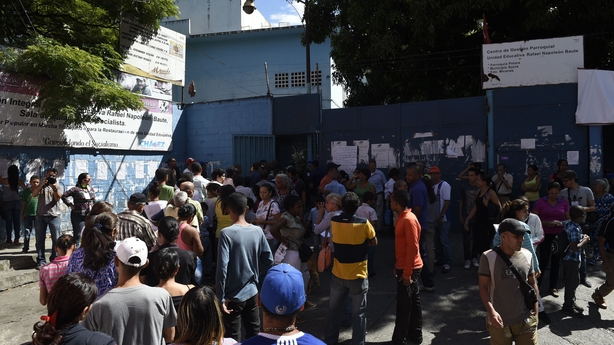Venezuelan President Nicolas Maduro is seeking a six-year term in an apparently poorly attended vote condemned by foes as the "coronation" of a dictator and likely to bring fresh foreign sanctions.
With the mainstream opposition boycotting the election, two of his most popular rivals barred from standing and state institutions in loyalists' hands, the 55-year-old former bus driver is expected to win despite his unpopularity.
That could trigger oil sanctions from Washington, and more censure from the European Union and Latin America.
The self-described "son" of Hugo Chavez says he is battling an "imperialist" plot to crush socialism and take over the OPEC member's oil wealth.
But opponents say the leftist leader has destroyed Venezuela's once-wealthy economy and ruthlessly crushed dissent.
Mr Maduro's main challenger is former state governor Henri Falcon, who predicts an upset due to widespread fury among Venezuela's 30 million people at the economic meltdown.
Most analysts believe that Mr Falcon has only a slim chance given abstention, the vote-winning power of state handouts, and Mr Maduro's allies on the election board.
Results are expected by late evening.
Attendance appeared low across the country, from the wealthier eastern Caracas to the fiercely anti-Maduro Andean mountains near Colombia.

There were some lines, however, outside polling stations in poorer government strongholds, and the majority of voters interviewed said they were backing Mr Maduro.
The government has set up so-called "red point" zones close to polling stations so Venezuelans can scan their state-issued 'fatherland card' through which they receive benefits including food boxes and money transfers.
Mr Maduro has promised a "prize" to those who do so.
Critics say this is a way of scaring impoverished Venezuelans into sticking with his government.
Mr Falcon said his team had received some 350 complaints about the "red points."
Three state workers also told Reuters they were pressured to vote, while pro-government activists hovered around some polling stations, saying they were assisting voters.
Further hurting Mr Falcon's chances by splitting the anti-Maduro vote is a third candidate, evangelical pastor Javier Bertucci, who has picked up quite a following, not least thanks to his free soup handouts.
Based on impressions from Reuters reporters in major cities around the nation, turnout looked far from the 80% figure of Venezuela's last presidential election in 2013.
Many Venezuelans are disillusioned and angry over the election: They criticize Mr Maduro for economic hardships and the opposition for its dysfunctional splits.
Reeling from a fifth year of recession, falling oil production and US sanctions, Venezuela is seeing growing levels of malnutrition, hyperinflation, and mass emigration.
"I'm telling the world - Stop your aggressive campaign against Venezuela," Mr Maduro said as he voted, blaming opponents for the country's mess but giving no specifics of possible reforms to nearly two decades of state-led economic policies.
Pro-boycott activists planned some scattered protests.
State television urged Venezuelans to vote and Information Minister Jorge Rodriguez said some 2.5 million had voted by around 10am EDT local time, prompting ridicule from the opposition.
Some opposition supporters, however, say the boycott only makes life easier for Maduro and that his rivals should have fought him at the ballot box despite an unfair playing ground.

